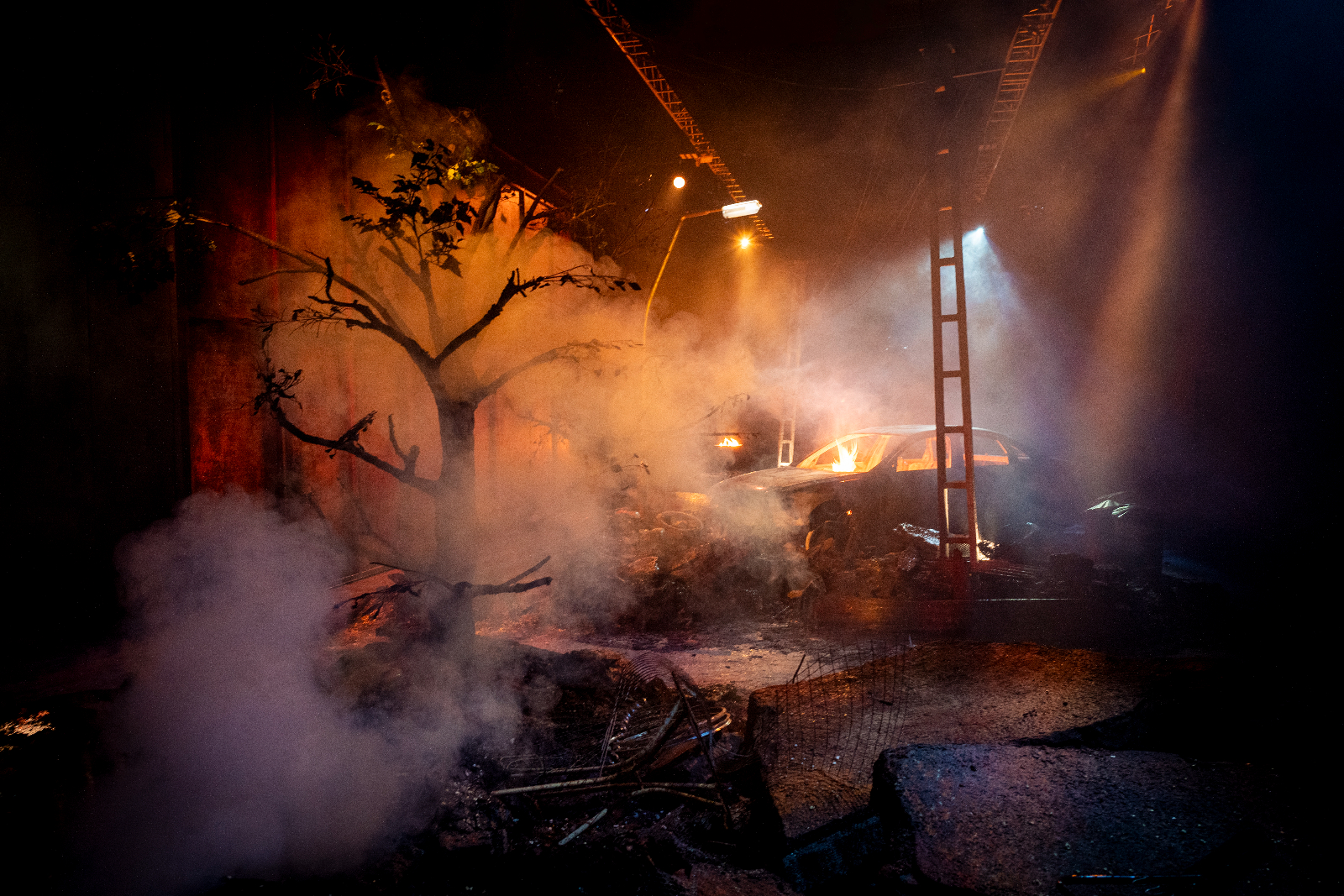Macbeth, The Depot, Liverpool review - Ralph Fiennes leads a conventional production in an unconventional space | reviews, news & interviews
Macbeth, The Depot, Liverpool review - Ralph Fiennes leads a conventional production in an unconventional space
Macbeth, The Depot, Liverpool review - Ralph Fiennes leads a conventional production in an unconventional space
Touring show lands first in Liverpool with a terrifying relevance

Next door to the beautiful Art Deco Littlewoods Pools Building, nearly 30 years standing derelict, a set of grey sheds stand, a seat of potential for Liverpool’s nascent film industry. Nearly a century ago, the long, white, towered construction in which the next "Spend! Spend!
Inside, things are different, at least for now. The Shakespeare Theatre Company have launched their touring, site-specific Macbeth in your reviewer’s native city, first on a list that also includes Edinburgh, London and Washington DC. Even my taxi driver (good luck with public transport!) evinced a little Scouse pride, needing no directions and disappointed not to have hands on tickets himself, as only the dearest ones were left when he looked. Eurovision and Ralph Fiennes in the same year!
 To many queuing up for entry, grateful that the wind was not, for once, biting, the opening tableau of a burnt out car on a bombsite will evoke images from Gaza or Mariupol, but, and this is an advantage of using alternative spaces for theatre, locals might think differently. I thought of the bombsites of the Blitz, still undeveloped 30 years on or of The Albert Dock, now the jewel in the city’s cultural crown, but 40 years ago, a post-industrial wasteland. I threw my mind forward a couple of hours to the end of the play, when a kingdom that had torn itself apart stood in that toughest of places, the start of a new age, and reflected that Liverpool's 2023 iteration had advanced some way beyond that. Like many ex-pats who will return for this showpiece occasion, I inwardly acknowledged that it was no thanks to me.
To many queuing up for entry, grateful that the wind was not, for once, biting, the opening tableau of a burnt out car on a bombsite will evoke images from Gaza or Mariupol, but, and this is an advantage of using alternative spaces for theatre, locals might think differently. I thought of the bombsites of the Blitz, still undeveloped 30 years on or of The Albert Dock, now the jewel in the city’s cultural crown, but 40 years ago, a post-industrial wasteland. I threw my mind forward a couple of hours to the end of the play, when a kingdom that had torn itself apart stood in that toughest of places, the start of a new age, and reflected that Liverpool's 2023 iteration had advanced some way beyond that. Like many ex-pats who will return for this showpiece occasion, I inwardly acknowledged that it was no thanks to me.
That’s a long way to go to extract some specificity (some might say justification, but I won’t) for this production which turns out to be a rather orthodox staging of Shakepeare’s examination of ambition, power and violence mixed with crowd (and monarch) pleasing supernatural interludes. That said, it’s all the better for leaving the innovation to be wrapped around the action that director, Simon Godwin, orchestrates on a thrust stage beautifully lit by Jai Morjaria, whose shadows underpin the narrative perfectly.
Fiennes gives us a world-weary Macbeth, initially amused as much as surprised by the Witches’ prophecies. Dressed in combat fatigues and with fighter aircraft flying overhead, he suggests the here-and-now, but there is no modern military technology on show, not even a mobile phone. An allusion to the fact that the war just concluded, in part due to his heroic leadership, has taken his country back to the Stone Age? Not with jets screaming above.
There’s more jarring with The Weird Sisters’ look. Danielle Fiamanya, Lucy Mangan and Lola Shalam are dressed by Frankie Bradshaw as if they were caught on their way back from Glasto, with no hubble-bubble, just a strange curse of a prediction one might expect had one refused to pick them up when hitch-hiking home. It’s an underwhelming trigger to tip a Thane into madness.
More convincing is Indira Varma’s breezily efficient Lady Macbeth. Silk blouse and trousers, she looks more prepared for a board meeting than the triumphant return of a war-hero husband, but there’s passion and love between the two, and a hint that it is the distaff side of the marriage that really harbours the ambition.
Both speak their lines beautifully (as does Ben Turner, in a near scene-stealing turn as Macbeth’s nemesis, Macduff). It shouldn’t be a matter for remark, but the verse and concomitant rhythms are so often lost in 21st century productions - it was a delight to relax into the language rather than struggle to keep up, Christopher Shutt's sound design working well in a tricky space.
Verma’s descent into spot-scrubbing psychosis is less demonstrative than is often portrayed, but that absence of showiness pays off with her brutal commitment to her unsexing and ruthless stiffening of her husband’s spine when doubts over the intended regicide creep into his head. I could not help but be reminded of Kate Middleton, whose bonhomie and upper middle class ordinariness occasionally slips to show a steeliness of purpose when decisions must be made. Of course, kings and queens do not go round murdering each other these days - character assassination by press briefing is as literal as it gets.
There’s Banquo’s ghost, gory blood spilt and real sparks from real swords in the climactic fight scene (Kate Waters choreographing the thrills and spills), so the spectacle is delivered if not quite the immersive experience some may have been led to expect. Fiennes will please his fans, and his approach to the line readings should please everyone, but his age, 60 now and, commendably, not hiding it, pulls something away from his character arc.
Would a man with so much experience of the world have his head turned so easily, be so suddenly seized with the prospect of the Crown, so all-in as to order the murder of Macduff’s "pretty ones"? Then again, one looks around the world at populist politicians of that vintage and older, and one is forced to reflect that Shakespeare’s excavations of human psychology are so penetrative that such trivial observations are merely incidental to the eternal truths he so dazzlingly reveals.
rating
Share this article
The future of Arts Journalism
You can stop theartsdesk.com closing!
We urgently need financing to survive. Our fundraising drive has thus far raised £49,000 but we need to reach £100,000 or we will be forced to close. Please contribute here: https://gofund.me/c3f6033d
And if you can forward this information to anyone who might assist, we’d be grateful.

Subscribe to theartsdesk.com
Thank you for continuing to read our work on theartsdesk.com. For unlimited access to every article in its entirety, including our archive of more than 15,000 pieces, we're asking for £5 per month or £40 per year. We feel it's a very good deal, and hope you do too.
To take a subscription now simply click here.
And if you're looking for that extra gift for a friend or family member, why not treat them to a theartsdesk.com gift subscription?
more Theatre
 The Line of Beauty, Almeida Theatre review - the 80s revisited in theatrically ravishing form
Alan Hollinghurst novel is cunningly filleted, very finely acted
The Line of Beauty, Almeida Theatre review - the 80s revisited in theatrically ravishing form
Alan Hollinghurst novel is cunningly filleted, very finely acted
 Wendy & Peter Pan, Barbican Theatre review - mixed bag of panto and comic play, turned up to 11
The RSC adaptation is aimed at children, though all will thrill to its spectacle
Wendy & Peter Pan, Barbican Theatre review - mixed bag of panto and comic play, turned up to 11
The RSC adaptation is aimed at children, though all will thrill to its spectacle
 Hedda, Orange Tree Theatre review - a monument reimagined, perhaps even improved
Scandinavian masterpiece transplanted into a London reeling from the ravages of war
Hedda, Orange Tree Theatre review - a monument reimagined, perhaps even improved
Scandinavian masterpiece transplanted into a London reeling from the ravages of war
 The Assembled Parties, Hampstead review - a rarity, a well-made play delivered straight
Witty but poignant tribute to the strength of family ties as all around disintegrates
The Assembled Parties, Hampstead review - a rarity, a well-made play delivered straight
Witty but poignant tribute to the strength of family ties as all around disintegrates
 Mary Page Marlowe, Old Vic review - a starry portrait of a splintered life
Tracy Letts's Off Broadway play makes a shimmeringly powerful London debut
Mary Page Marlowe, Old Vic review - a starry portrait of a splintered life
Tracy Letts's Off Broadway play makes a shimmeringly powerful London debut
 Little Brother, Soho Theatre review - light, bright but emotionally true
This Verity Bargate Award-winning dramedy is entertaining as well as thought provoking
Little Brother, Soho Theatre review - light, bright but emotionally true
This Verity Bargate Award-winning dramedy is entertaining as well as thought provoking
 The Unbelievers, Royal Court Theatre - grimly compelling, powerfully performed
Nick Payne's new play is amongst his best
The Unbelievers, Royal Court Theatre - grimly compelling, powerfully performed
Nick Payne's new play is amongst his best
 The Maids, Donmar Warehouse review - vibrant cast lost in a spectacular-looking fever dream
Kip Williams revises Genet, with little gained in the update except eye-popping visuals
The Maids, Donmar Warehouse review - vibrant cast lost in a spectacular-looking fever dream
Kip Williams revises Genet, with little gained in the update except eye-popping visuals
 Ragdoll, Jermyn Street Theatre review - compelling and emotionally truthful
Katherine Moar returns with a Patty Hearst-inspired follow up to her debut hit 'Farm Hall'
Ragdoll, Jermyn Street Theatre review - compelling and emotionally truthful
Katherine Moar returns with a Patty Hearst-inspired follow up to her debut hit 'Farm Hall'
 Troilus and Cressida, Globe Theatre review - a 'problem play' with added problems
Raucous and carnivalesque, but also ugly and incomprehensible
Troilus and Cressida, Globe Theatre review - a 'problem play' with added problems
Raucous and carnivalesque, but also ugly and incomprehensible
 Clarkston, Trafalgar Theatre review - two lads on a road to nowhere
Netflix star, Joe Locke, is the selling point of a production that needs one
Clarkston, Trafalgar Theatre review - two lads on a road to nowhere
Netflix star, Joe Locke, is the selling point of a production that needs one
 Ghost Stories, Peacock Theatre review - spirited staging but short on scares
Impressive spectacle saves an ageing show in an unsuitable venue
Ghost Stories, Peacock Theatre review - spirited staging but short on scares
Impressive spectacle saves an ageing show in an unsuitable venue

Add comment